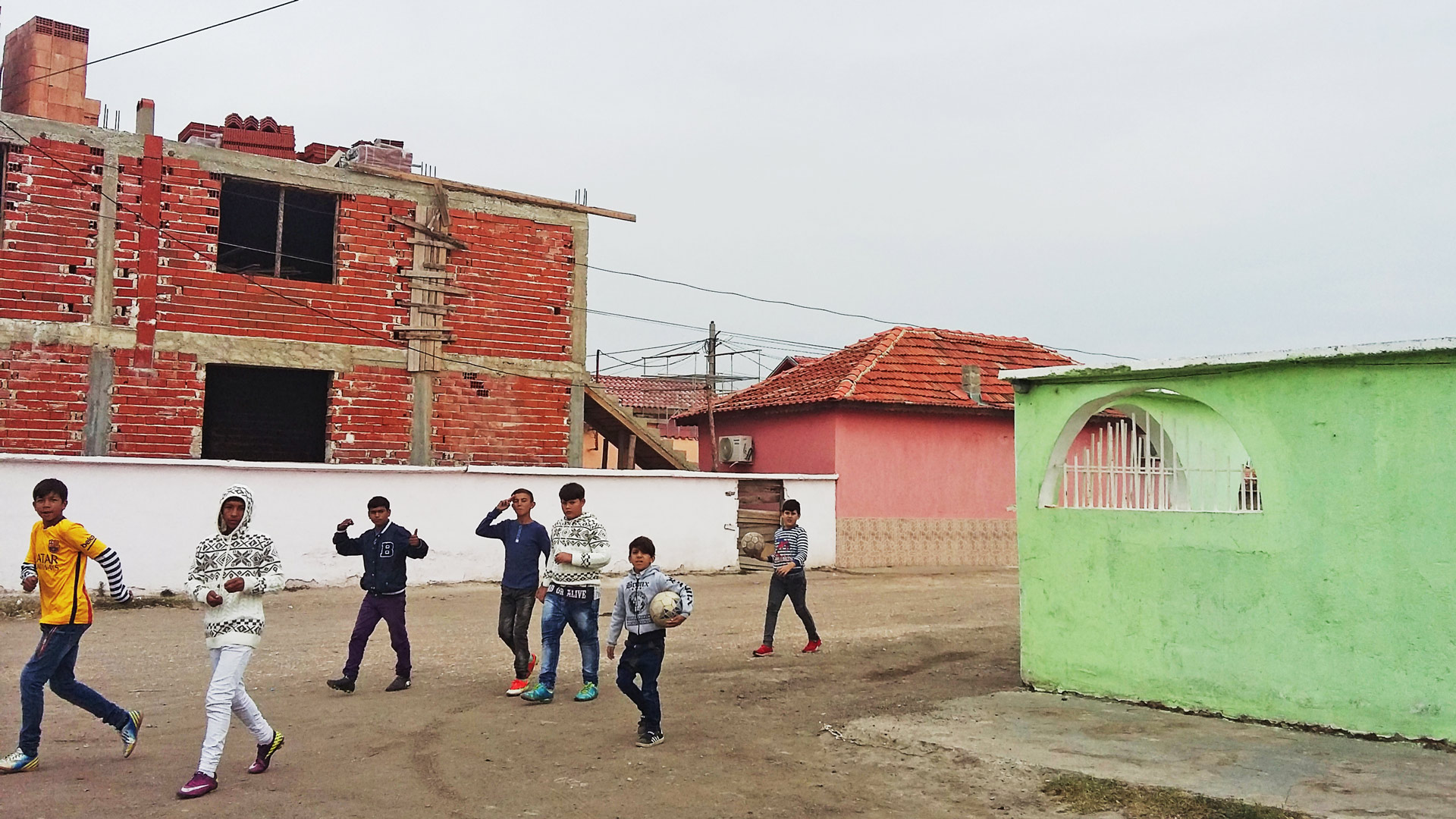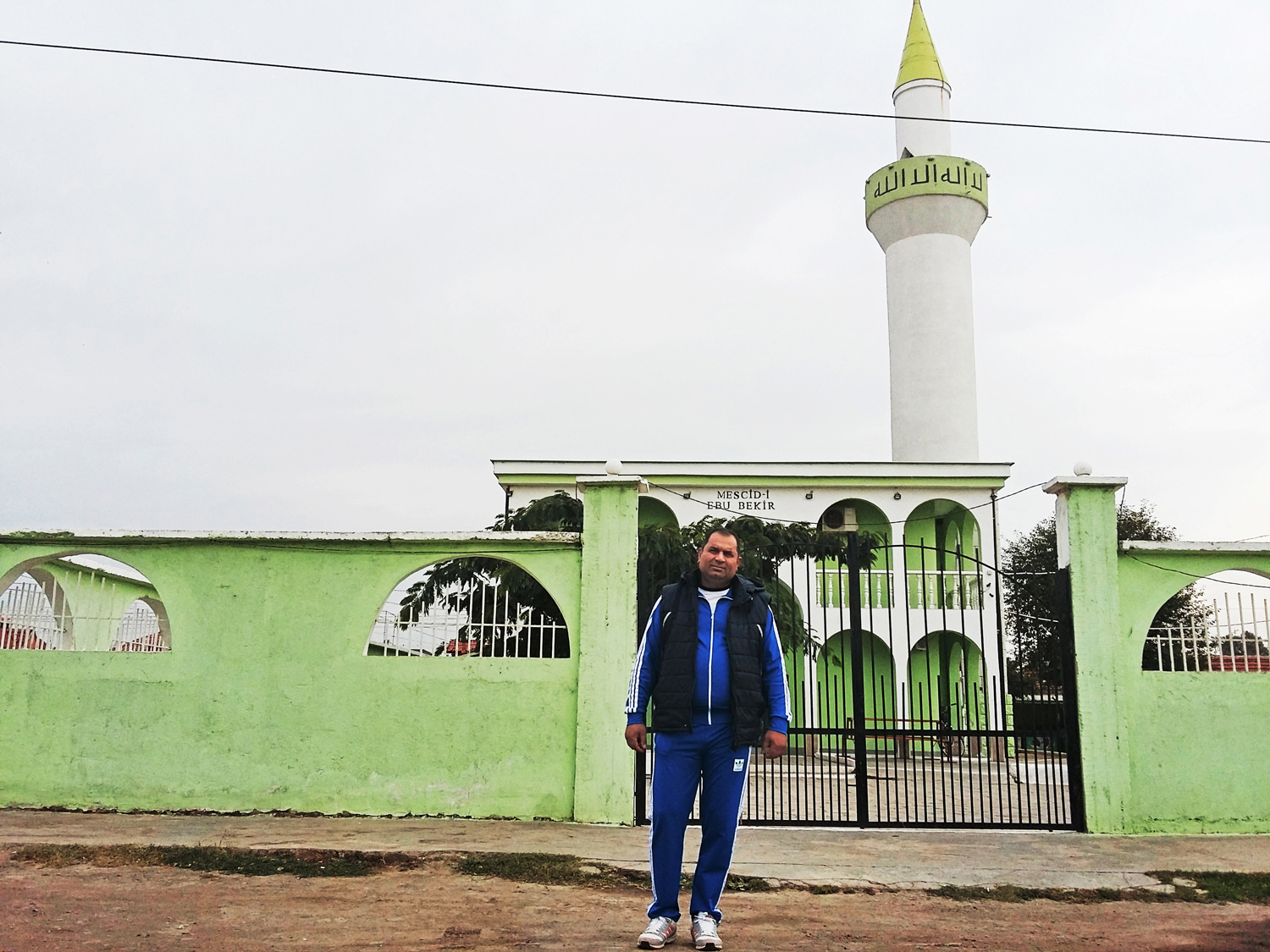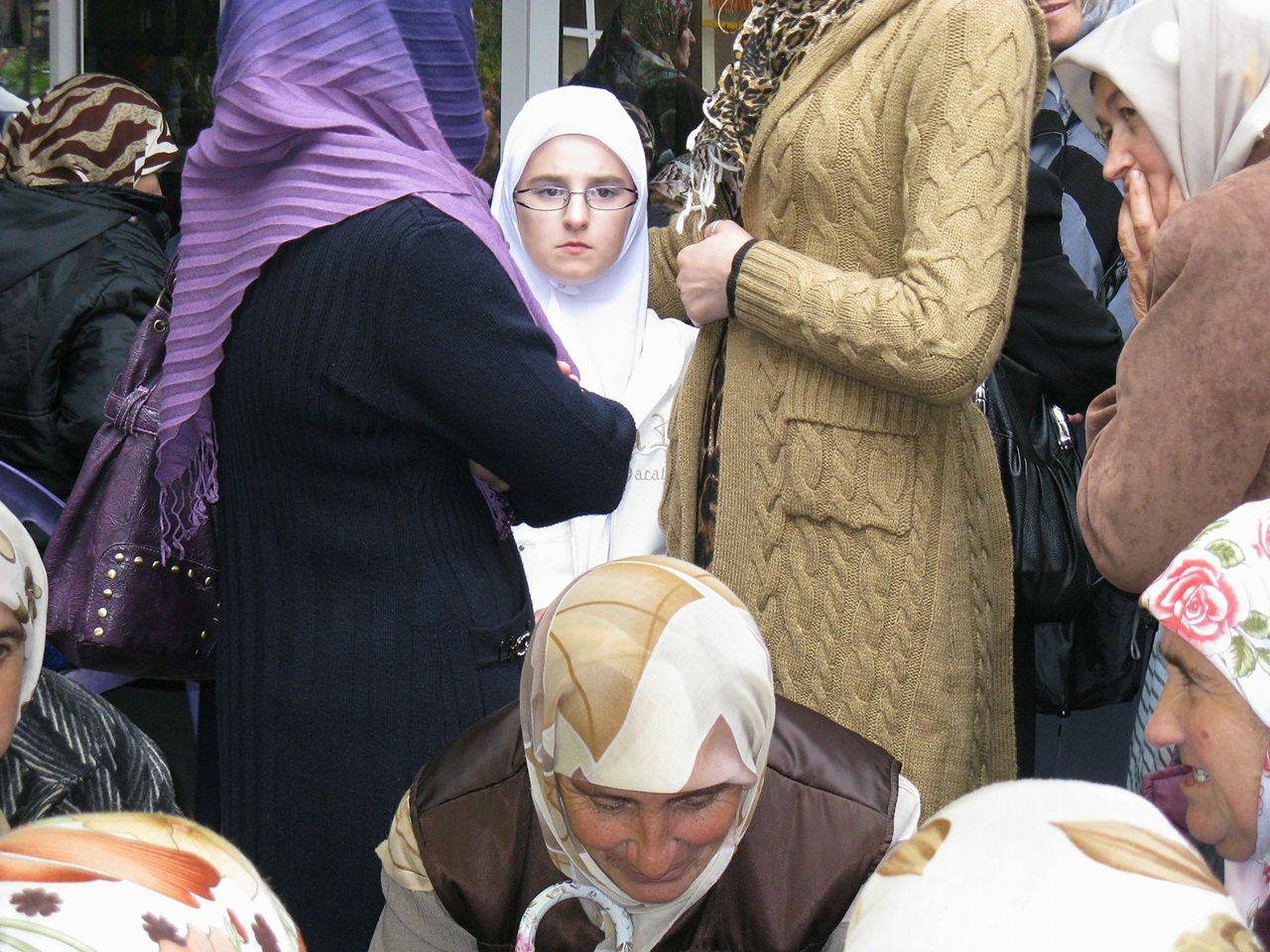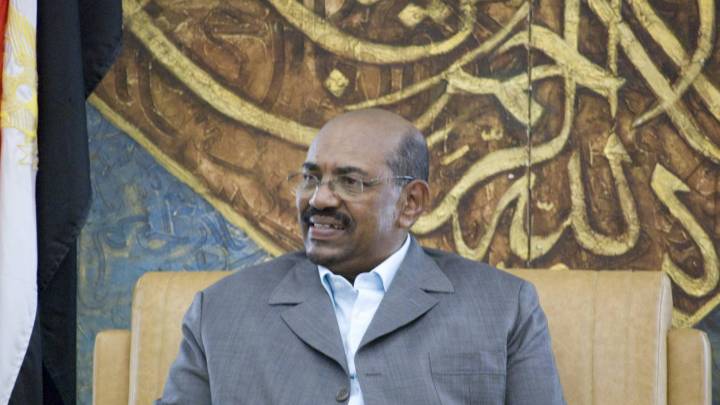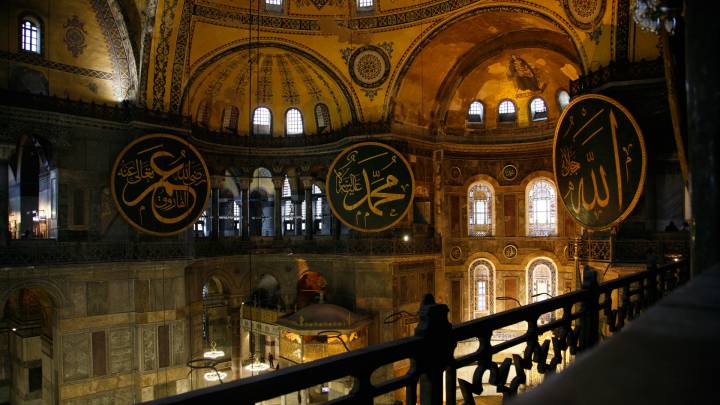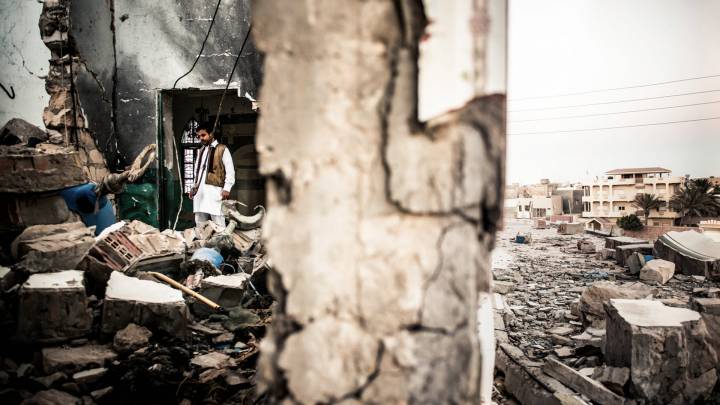The threat of radicalisation of Roma is often raised by politicians and media commentators in Bulgaria. But economic exclusion makes Roma communities open to gestures of friendship or financial support, giving radical groups a target.
The spectre of Islamisation is haunting the southern Balkans – at least according to scare-mongering scenarios circulated by senior politicians and the media in Bulgaria. The country’s former prime minister, Ivan Kostov, last year claimed that 25,000 Bulgarian Muslims had been radicalised. Meanwhile, the country’s Roma minority is hypothesised as having a higher susceptibility to radicalisation due to their social and economic exclusion. Ground zero for Roma radicalisation is Pazardjik, a small town in southern Bulgaria often portrayed in Bulgarian media as the gateway of this so-called ‘Gypsy indoctrination’, a view partly informed by dramatic images of state security forces at the Ebu Bekir mosque in the Iztok mahalla (the so-called ‘gypsy quarter’) in 2014. Previously known as Tatar Pazardjik – ‘small marketplace of the Tatars’ – the town still lives by the laws of the bazaar, but what is being bargained today are religious beliefs.
But when Raiko Jivkov, a co-founder of the notorious mosque, enters the smoke-filled coffee shop where we had arranged to meet, he hardly has the appearance one expects of a man connected with a supposed centre of Islamic radicalisation. He is clean-shaven with a military haircut, and his blue-and-white-striped tracksuit with sleeveless black polyester jacket follows contemporary Bulgarian fashion imperatives that overrule all class and ethnic backgrounds. After a quick exchange with the café owner – a robust lady in her fifties who casts a wary eye from behind the counter – he orders me a cup of Nescafé instant cappuccino, a drink infamously popular among my compatriots, and joins the table.
What is being generated here is ignorance, not knowledge, but the national authorities do not pay much attention.Jivkov, who also serves as local council representative of EVROROMA (the Roma party of Bulgaria), points out a young bearded man passing by the gloomy run-down building of the local secondary school outside the café. If it were not for his long-sleeved qamis tunic and his loose sirwal trousers, his beard would better fit the average Berlin hipster than a Salafi Jihadist. “Here you have your Taliban,” Jivkov remarks ironically.
He openly blames the state for its short-sighted negligence and inability to adequately address social grievances in the forsaken Roma districts. In public statements, he pleads for education to be improved, and for broader health insurance for the country’s neglected ethnic minority communities. “Next September 15th [the first day of school in Bulgaria], the teachers of this school should be getting thorns instead of flowers. Most of their students remain illiterate and cannot even speak proper Bulgarian. What is being generated here is ignorance, not knowledge, but the national authorities do not pay much attention. If they do not want the ghetto to educate the kids, they should start educating the children themselves.”
Conventional wisdom is that economic deprivation makes Roma – and other minority groups in Bulgaria – a target for Islamic radicalisation. In 2005, then American ambassador John Beyrle wrote the following in a confidential briefing on the topic: “Rampant unemployment, weak moderate Islamic institutions, and a history of discrimination enhance the vulnerability of Bulgarian Muslims to extremist exploitation.” (The highly controversial briefing was released by WikiLeaks in 2010, and was notable for a number of factual errors.) For his part, Jivkov believes that the Roma’s collectively experienced exclusion and alienation from formal government services makes them easy prey for all sorts of missionary preaching, whether it be Salafism, Sufism, Christian evangelism or even Seventh-day Adventism.
That Roma – the third largest ethnic community in Bulgaria after Bulgarians and Turks – are subject to social and economic marginalisation is hardly in question. A 2012 report by the Decade of Roma Inclusion Secretariat Foundation found that half of all Roma they interviewed had experienced ethnic discrimination while looking for medical services in Bulgaria; a third felt they had experienced discrimination during their application process for social benefits, and a similar proportion in their search for employment. Meanwhile, 52 per cent of Roma in Bulgaria between the ages of 20 and 64 described themselves as unemployed, according to a 2012 EU and UNDP report.
Around 13 per cent of the 325,343 Romani people in Bulgaria identify as Muslim, according to official data. The majority are often referred to as ‘Turkified Roma’ – they speak Turkish and perceive themselves as Turks or simply as Muslims. This is the case with Jivkov. Under the communist restrictions on religious affairs, his family practised a folkloric form of Islam built around customs, rituals and superstitions which according to conservative Islamic readings would be certainly regarded as shirk (شرك), the sin of idolatry.
Freedoms After Communism
There has been a lot of exaggeration, wilful misinterpretation and counter-productive interrogation techniques, as most of the arrested and the witnesses could not understand fully the questions addressed... Since the fall of the communist regime and opening up of religious freedoms, successive Bulgarian governments have sought atonement for past repressions by opening doors to religious diversity and social inclusion. Since 1991, the country’s Muslim community has been led by the Office of the Chief Mufti of Bulgaria, promoting a moderate version of Islam. But due to its fragile authority and limited funds it has been unable to effectively counter the influence of foreign religious foundations, which have funded mosques across the Balkans and are suspected to encourage extremist beliefs. Charities including the Saudi Arabian-funded Al Waqf-Al Islami and its successor in Bulgaria, Taiba (whose founder Abdurahman Taha was expelled from Bulgaria in 1998 for illegally preaching against the state), have been eager to capitalise on the economic and ideological vulnerability of both Pomaks (ethnic Bulgarian Muslims) and Roma.
Travel abroad with the expanded freedom of movement since 1989 has also exposed Roma to more conservative religious teachings. Driven by a quest for new opportunities, Jivko himself arrived in the German city of Cologne, a very popular destination among Bulgarian Roma looking for a way out of the vicious circle of welfare dependence, misery and petty crime. There he first encountered Germany-based Turkish radical Islamist organisation Kalifatstaat (Caliphate State). In 2003, these Cologne connections would feed into allegations by the Regional Directorate of the Ministry of the Interior in Pazardjik that Jivko had been receiving money and other material gifts in exchange for mobilising Kalifatstaat supporters in the Roma quarter of Iztok. Jivkov had to leave the country, travelling to Switzerland, he says. However, due to a lack of evidence, no official charges have been pressed by the Prosecutor’s Office.
Islamic perspectives on wealth distribution, economic and social justice in particular have been seen as an attractive alternative to the widely perceived economic segregation that Roma people experience, says Jivko, describing exclusion from what he refers to as “Bulgarian society”. “A lot among us who are Turkish-speaking and have been stranded across Europe looking for jobs and shelter have been well received in various mosque communities in Germany and Austria,” he says. “It is not surprising that one would then try to appeal more to those who have stretched out a helping hand than those who deny one participation on an equal footing.”
A milestone on Jivko’s spiritual path was his pilgrimage to Mecca, Islam’s holiest site, which left him fascinated by the display of an “indiscriminate openness and tolerance to hujjaj [pilgrims] no matter their race, class or ethnicity”. “I had the honour of being invited as guest of the King together with other pilgrims. We could meet and talk to state officials and were offered accommodation, food and water supplies as well as a package of religious books destined for the pilgrims. There was nothing remotely radical there,” he says. At the same time there is a certain naivité – Jivko, who is infatuated with Sufism and fond of quoting from the 13th century poet Rumi, a Sufi mystic, is caught by surprise when I raise the question of Saudi Arabia’s often contradictory policy towards the “mystical” Sufi brotherhoods.
After years of feeling segregated, it’s not a shock that the apparent generosity of the Saudi approach was embraced without further questioning. According to Jivko, it is this warm feeling of belonging that he hopes the downtrodden will find in the Ebu Bekir mosque, a religious safe haven for Roma to gather and learn about Islam. But even though he does not hide his enthusiasm about his Mecca voyage and the “moral support and guidance” he received from religious authorities, he skilfully parries a question regarding any financial support from Saudi Arabian foundations for the establishment of the mosque. Instead, he prefers to underline the backing by the Mufti’s office and by those he describes as “local donors”. Nevertheless, in view of the wretched infrastructure and the bitterly poor surroundings of the mosque, in comparison to which even the French banlieues might seem preferable, one ends up doubting the so-called domestic philanthropists claimed by Jivkov to be putting money into “community organising” around a “house of prayer”.
The Raid
State suspicion culminated in a raid of the mosque in November 2014, a joint operation by the State Agency for National Security (SANS) and prosecutors investigating the distribution of Islamist militant propaganda. 26 people were arrested, and 14 were charged. Among them was charismatic and regionally popular imam Ahmed Moussa, charged for inciting religious hatred and disseminating the extremist ISIS narrative, who remains in prison. According to official documents obtained by the Balkan Investigative Reporting Network (BIRN), Moussa and his disciples had been also providing logistic support to foreign jihadists embarking on their ‘holy war’ to Syria.
Moussa himself, born Angel Stoyanov, did not convert to Islam until the 1990s when he travelled to Austria. In 2001, like Jivkov, he forged connections with Kalifatstaat. Shortly before the Cologne radical organisation’s official ban by German authorities in December that year, he is said to have agreed to spread its dubious ideology across his networks in Bulgaria through online and offline propaganda. Not having a licence from the Grand Mufti’s Office did not prevent him from transforming his home into a place of worship or holding sermons on private occasions like weddings and funerals. And his “magnetic influence” – as his lawyer in two previous trials, Harry Haralampiev, has described it – was not confined to the coffee shops and streets of the Iztok neighbourhood. Through social media channels and chat groups, his words soon spread to neighbouring communities and even reached migrants in Western Europe. Under his influence, the regular male audience of the Ebu Bekir mosque started growing their beards longer and displaying an interest in Islamic fashion. Later that year, these trends led to the authorisation of a burka ban, even threatening the suspension of social security benefits for the women who defy it. Moussa remains in prison after being convicted for charges that include preaching anti-democratic ideology and hatred on religious grounds.
Unsurprisingly, Jivko believes the raid and subsequent legal manoeuvres to have been unjustified. “There has been a lot of exaggeration, wilful misinterpretation and counter-productive interrogation techniques, as most of the arrested and the witnesses could not understand fully the questions addressed to them in Bulgarian and replied in a vague manner, allowing security officials to bend the content of their statements,” he says. “If people like Ahmed Moussa have had private connections to extremist networks and have used those for their personal benefit, why should other innocent members of the community share the blame? For example, one of the guys was detained for 14 months for nothing but an amateur photo collage, where he had pasted an image of himself on a picture of Daesh fighters distributed through social media. Does this foolish act make him a militant radical?”
Whether the Ebu Bekir mosque should still be given the benefit of the doubt is a decision to be taken by national security authorities. Nevertheless, history teaches us that police raids, detention campaigns and disciplinary facilities alone seldom result in a safer environment, and heavy-handed police action can polarise community views and provide ammunition for extremists.
The only way to reduce the possibility of radicalisation is to target the gross inequality that explains its allure. Yet, in the current zeitgeist of widely spread paranoia and post-fact discourse, more and more Bulgarians put the blame on Brussels for supposedly ‘over-spoiling’ minorities at the cost of the general population’s well-being. Such troubling convictions seem to be gaining popularity among both Bulgaria’s taxi drivers and street vendors, as well as in the circles of jobless academics and low-paid civil servants. With average salaries stagnating while the cost of living rises, the mounting discontent among working and middle-class Bulgarians should be addressed. But this must go hand in hand with effective Roma integration measures, especially in underprivileged milieus such as Iztok where the Roma minority has long since forgotten the meaning of citizenship of the state.
Jivkov is rightly sceptical. Citing from a favourite novel on the spiritual teachings of the Sufi master Rumi, he warns of the status quo in his country: “The overwhelming majority of people do not think ahead, and those thinking will never become the overwhelming majority.” Still, socially aware Bulgarians do have a legal and – more importantly – moral responsibility to counter the roots of anti-Gypsyism and unlock new opportunities for participation in social and economic matters. Otherwise, religious confession will remain a matter of outbidding the loudest pulpiteer at the bazaar, and the so far grossly and carelessly overstated ‘radicalisation’ of one marginalised group may become a self-fulfilling prophecy.
Inna Rudolf completed her Master’s degree in Political Science and Islamic Studies at the University of Heidelberg in 2012, specialising in International Conflict Research and Middle Eastern Studies. Based in Berlin and Tunis, she represents the BMW Foundation Herbert Quandt in the MENA region. She is currently seconded as research director for the Maghreb Economic Forum, a Tunis-based NGO. Her research concentrates on approaches for the prevention of radicalisation and violent extremism, particularly through the promotion of cultural and social inclusion.
